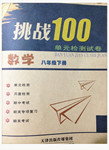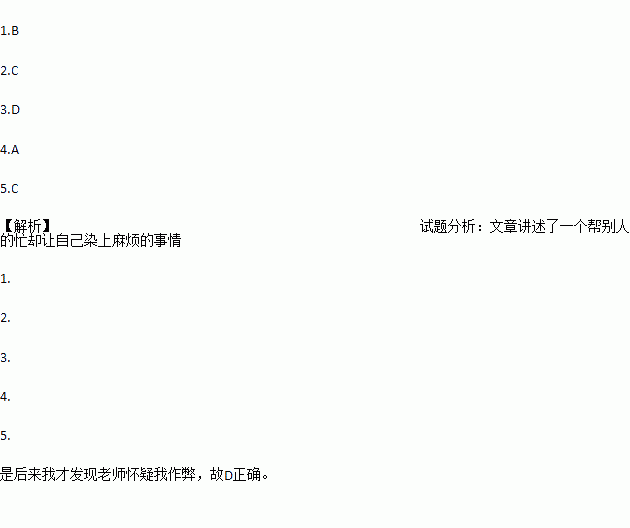题目内容
I found out one time that doing a favor for someone could get you into a lot of trouble. I was in the eighth grade at the time, and we were having a final test. During the test, the girl sitting next to me whispered something, but I didn’t: understand. So I leaned over her way and found out that she was trying to ask me if I had an extra pen. She showed me that: hers was out of ink and would not write. I happened to have an extra one, so I took it out of my pocket and put it on her desk.
Later, after the test papers had been turned in, the teacher asked me to stay in the room when all the other students were dismissed(解散). As soon as we were alone she began to talk to me about what it meant to grow up;she talked about how important it was to stand on your own two feet and be responsible (负责任) for your own acts. For a long time, she talked about honesty and emphasized(强调) the fact that when people do something dishonest, they are really cheating(欺骗) themselves. She made me promise that I would think seriously(认真地) about all the things she had said, and then she told me I could leave. I walked out of the room wondering why she had chosen to talk to me about all those things.
Later on, I found out that she thought I had cheated on the test. When she saw me lean over to talk to the girl next to me, it looked as if I was copying answers from the girl’s test paper. I tried to explain about the pen, but all she could say was it seemed very strange to her that I hadn’t talked of anything about the pen the day she talked to me right after the test. Even if I tried to explain that I was just doing the girl a favor by letting her use my pen, I am sure she continued(继续) to believe that I had cheated on the test.
1.The story took place(发生) exactly ________.
A. in the teacher’s office
B. in an exam room
C. in the school
D. in the language lab
2.The girl wanted to borrow a pen, because ________.
A. she had not brought a pen with her
B. she had lost her own on her way to school
C. there was something wrong with her own
D. her own had been taken away by someone
3.The teacher saw all this, so she asked the boy ________.
A. to go on writing his paper
B. to stop whispering
C. to leave the room immediately
D. to stay behind after the exam
4.The thing(s) emphasized in her talk was (were) ________.
A. honesty B. sense of duty
C. seriousness D. all of the above
5.The boy knew everything ________.
A. the moment he was asked to stay behind
B. when the teacher started talking about honesty
C. only some time later
D. when he was walking out of the room
 挑战100单元检测试卷系列答案
挑战100单元检测试卷系列答案
